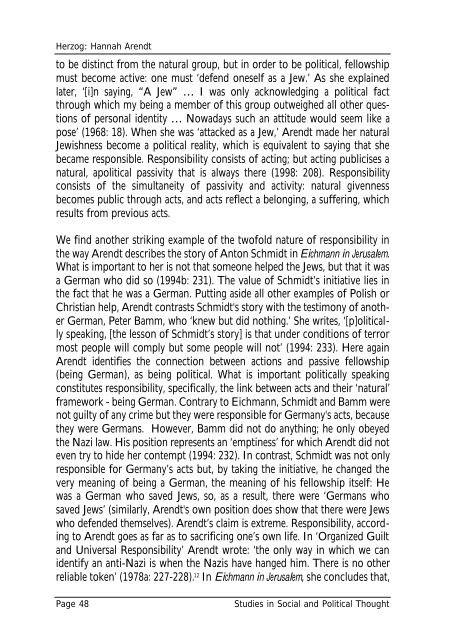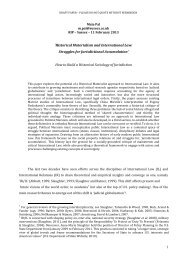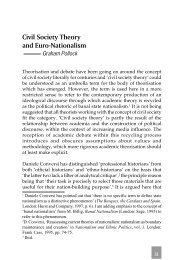Hannah Arendt's Concept of Responsibility - University of Sussex
Hannah Arendt's Concept of Responsibility - University of Sussex
Hannah Arendt's Concept of Responsibility - University of Sussex
Create successful ePaper yourself
Turn your PDF publications into a flip-book with our unique Google optimized e-Paper software.
Herzog: <strong>Hannah</strong> Arendt<br />
to be distinct from the natural group, but in order to be political, fellowship<br />
must become active: one must ‘defend oneself as a Jew.’ As she explained<br />
later, ‘[i]n saying, “A Jew” … I was only acknowledging a political fact<br />
through which my being a member <strong>of</strong> this group outweighed all other questions<br />
<strong>of</strong> personal identity … Nowadays such an attitude would seem like a<br />
pose’ (1968: 18). When she was ‘attacked as a Jew,’ Arendt made her natural<br />
Jewishness become a political reality, which is equivalent to saying that she<br />
became responsible. <strong>Responsibility</strong> consists <strong>of</strong> acting; but acting publicises a<br />
natural, apolitical passivity that is always there (1998: 208). <strong>Responsibility</strong><br />
consists <strong>of</strong> the simultaneity <strong>of</strong> passivity and activity: natural givenness<br />
becomes public through acts, and acts reflect a belonging, a suffering, which<br />
results from previous acts.<br />
We find another striking example <strong>of</strong> the tw<strong>of</strong>old nature <strong>of</strong> responsibility in<br />
the way Arendt describes the story <strong>of</strong> Anton Schmidt in Eichmann in Jerusalem.<br />
What is important to her is not that someone helped the Jews, but that it was<br />
a German who did so (1994b: 231). The value <strong>of</strong> Schmidt’s initiative lies in<br />
the fact that he was a German. Putting aside all other examples <strong>of</strong> Polish or<br />
Christian help, Arendt contrasts Schmidt's story with the testimony <strong>of</strong> another<br />
German, Peter Bamm, who ‘knew but did nothing.’ She writes, ‘[p]olitically<br />
speaking, [the lesson <strong>of</strong> Schmidt’s story] is that under conditions <strong>of</strong> terror<br />
most people will comply but some people will not’ (1994: 233). Here again<br />
Arendt identifies the connection between actions and passive fellowship<br />
(being German), as being political. What is important politically speaking<br />
constitutes responsibility, specifically, the link between acts and their ‘natural’<br />
framework - being German. Contrary to Eichmann, Schmidt and Bamm were<br />
not guilty <strong>of</strong> any crime but they were responsible for Germany's acts, because<br />
they were Germans. However, Bamm did not do anything; he only obeyed<br />
the Nazi law. His position represents an ‘emptiness’ for which Arendt did not<br />
even try to hide her contempt (1994: 232). In contrast, Schmidt was not only<br />
responsible for Germany’s acts but, by taking the initiative, he changed the<br />
very meaning <strong>of</strong> being a German, the meaning <strong>of</strong> his fellowship itself: He<br />
was a German who saved Jews, so, as a result, there were ‘Germans who<br />
saved Jews’ (similarly, <strong>Arendt's</strong> own position does show that there were Jews<br />
who defended themselves). Arendt’s claim is extreme. <strong>Responsibility</strong>, according<br />
to Arendt goes as far as to sacrificing one’s own life. In ‘Organized Guilt<br />
and Universal <strong>Responsibility</strong>’ Arendt wrote: ‘the only way in which we can<br />
identify an anti-Nazi is when the Nazis have hanged him. There is no other<br />
reliable token’ (1978a: 227-228). 12 In Eichmann in Jerusalem, she concludes that,<br />
Page 48<br />
Studies in Social and Political Thought
















